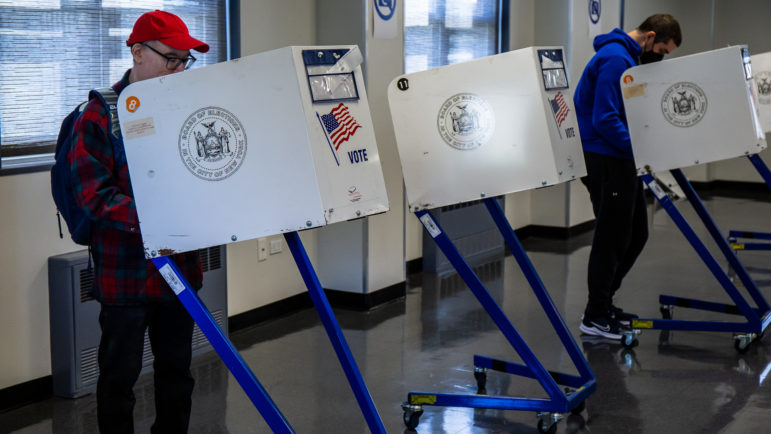“Even now one thing is certain: Bronx Democrats will not be able to ignore the importance of the Latino vote in this district and the all-important matter of due political representation.”

Adi Talwar
Voters in the Bronx on Election Day in 2022.Assembly Member Latoya Joyner’s recent resignation sent shock waves through the Bronx political establishment earlier this month. Joyner, a popular representative in her district and among many Bronx politicos, would likely have coasted to victory in this June’s primary, but word is that she has opted to take a job in the private sector.
This leaves the Bronx Democratic organization with a major decision to make: endorse another African American candidate, continuing a 40-year tradition, or, perhaps, support a Latina/o candidate in a district that is majority Latino?
The Bronx Democratic organization holds much sway in who will get the Democratic nomination in a soon-to-be-called special election. Along with the Queens Democratic Party, the Bronx Democratic organization is considered to be a powerhouse apparatus precisely in moments like these, since they have almost entire control of the county committee members who vote for the nominee. The eventual nominee is almost guaranteed success in a special election, since the 77th Assembly district, which Joyner has represented since 2015, is overwhelmingly Democratic.
So, who will Bronx Democrats nominate? The decision should be a difficult one for one critical reason: identity politics. For, as much as some may disdain it, identity politics play a pivotal role in electoral politics, and this is certainly the case in this Assembly district. There are many people who, like me, believe that proper political representation should be an important, though not exclusive, marker for selecting candidates.
With this in mind, here are some facts that I suggest should be a top concern of those making decisions within the Bronx Democratic organization:
Of Democratic voters in this Assembly district, 51 percent are Latinos. Though in the majority, Latino voting participation here lags behind that of other ethnic groups. This has certainly been the case in the 77th Assembly district. But recent election cycles suggest an awakening of sorts, with more Latinos voting. Based on my data and calculations, in a Democratic primary this June Latinos may comprise 46 percent of the overall vote. African Americans (with a growing African population) may comprise 43 percent of the vote.
Another important data point is that 64 percent of likely voters (and this includes a potential Latino electorate) are female. I have no doubt that a well-funded and organized campaign by a Latina candidate can win in a Democratic primary—provided there are not multiple Latinos running for the seat.
An important wild card is whom Congressman Adriano Espaillat will endorse. While he only represents a small chunk of this Assembly district in Congress (compared to Congressman Ritchie Torres), Espaillat has wide name recognition among many Latino voters in the West Bronx, many of whom are of Dominican origin.
Espaillat has not been shy about bucking the Bronx Democratic machine in portions of the Bronx he represents, as he did in the neighboring 78th Assembly district where he endorsed George Alvarez over the then long-time incumbent Jose Rivera. Alvarez won that race. Will Espaillat put his thumb on the scale?
The next week or so will provide lots of answers, but even now one thing is certain: Bronx Democrats will not be able to ignore the importance of the Latino vote in this district and the all-important matter of due political representation.
Eli Valentin is the founder of the Institute for Latino Politics and executive director of a new Latino studies program at Virginia Union University. He lives in New York with his family.








